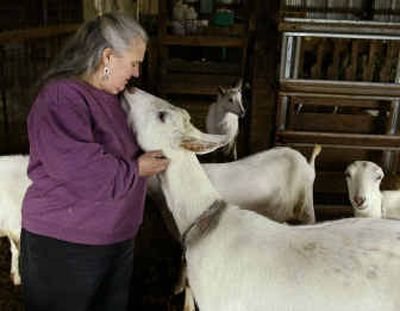Bill would make goat theft a felony

NAPAVINE, Wash. – Angel isn’t your average goat. The 5-year-old white Saanen doe has won numerous state awards and is worth well over $3,000.
But in the state of Washington, she isn’t considered livestock, and if someone tried to steal the prize show and dairy goat off Pat Hendrickson’s Napavine farm they’d only face misdemeanor charges.
Under bills before the House and Senate, goats would finally get the respect Hendrickson said is long overdue. Goat owners could be assured that thieves would face harsher penalties for stealing the animals, which can range in value from $100 to $16,000.
“For years and years, goats have always been the butt of jokes,” said Hendrickson, who has nearly 40 goats on her farm. “They’re not a $5 tin-can eating animal anymore.”
Since the state doesn’t designate goats as livestock, theft of them is usually only a misdemeanor, while theft of official livestock – like horses, mules, pigs or sheep – is a felony.
Livestock thieves are charged according to their motives. If the theft was done with intention to sell or exchange the animal, the culprit faces first-degree theft, which is punishable by up to 10 years in jail and $20,000 in fines. If they steal it to keep – or eat – for themselves, the charges are slightly less, and they face up to five years in prison and a $10,000 fine.
But as the law stands now, goats are only considered property, and the punishment depends solely on their worth. The bills before the Legislature don’t create a new law, they just designate goats as livestock and add them to the current livestock theft law.
“Right now if someone were to steal a $1,600 goat, they’d spend zero to 90 days in jail,” said Joseph Wheeler, senior deputy prosecuting attorney in Thurston County. “With this law, they’d get at least three to nine months, assuming they have no criminal history.”
If the culprit had a prior record, they’d face even more time, Wheeler said.
Sen. Jerome Delvin, R-Richland, first sponsored the bill last year after a constituent had several of her goats stolen, only to see the perpetrator get off with a slap on the wrist. The bill died last year, but versions have passed both the House and the Senate this session. Gov. Christine Gregoire has not yet taken a position on the proposal.
As of Jan. 1, the state had 22,500 goats, according to the U.S. Department of Agriculture’s agricultural statistics service in Olympia. In 1997, there were 15,992.
The highest concentration of goats is found in Yakima County, which has more than 3,100. Yakima County has less than a dozen goat theft cases a year, said David Thompson, the county sheriff’s chief criminal deputy.
“We probably have as many theft-of-dog reports as we do theft-of-goats,” he said.
The American Dairy Goat Association will hold its national show in Spokane in July, and thousands of goats from around the country are expected in the state.
“They’re quite an industry within the community that raises them,” Delvin said. “It’s an emerging part of the agriculture economy.”
And while goat cheese and milk are popular with mainstream consumers, there’s also a market for goat meat.
Kathleen Brown lost a 3-month-old Nubian doe kid worth about $300 several years ago after someone cut through one fence and knocked down another to get to her barn of about 15 show and dairy goats in Centralia. She said that in the days before the theft, people had been stopping by the farm wanting to buy goats for meat, but she said they weren’t for sale.
A plump kid, named Espresso because of her darker fur, was the one snatched.
“I think they ate her,” Brown said.
Brown bought a Doberman to keep between the two fences and had no further thefts, she said.
She has since sold the farm, and the only goats she has are those she leases out to other people. She said she thinks changing the law is a good idea, though she’s not sure if it would have helped Espresso.
“Will a locked door keep a burglar out if he really wants to get in?” she asked. But she said she hopes the bill gets signed into law.
“It’s a good start,” she said. “Some of them are going to think twice.”